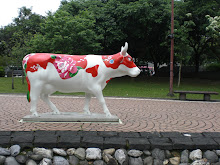Art and Naturism
Today Taiwan’s cable television stations reported on a university student posing nude for painters, and enjoying it. “I feel natural when I pose,” said Lu Chung-wei, a third-year literature student at National Chengkung University in the central Taiwanese town of Taichung.
Her words represent precisely what naturism is all about. Nature and naturalness. Feeling natural, feeling good. While being naked.
Often in Asia, the only opportunity for social nudity is given by art. Over the past few years, Taiwanese students have tried to organize naturist chess and ball games at an arts center in the southern town of Kaohsiung. The activity sounded just like a normal naturist sports game, but in order to win acceptance, it had to be presented as art. The arts center didn’t have a roof, but was closed off by walls from the outside.
In that case, the media played a negative role. After extensive media attention, the students’ school showed “concern” about the sports game. In the end, the lack of understanding forced the students to “dress up” and give up on naturism.
Late last year, a Taipei theater group included a short nude dancing scene in a long play, but attracted the attention of the police, who took photographs to study whether the play broke any laws. Protest from viewers, art lovers, and the local government – which had financed the play – turned police away and the play went on.
While art or nudity on stage cannot be considered naturism, they can introduce the public in Asia to social nudity, to being naked in a non-sexual context. And that's what I hope more and more Asians will understand. That there is nothing inherently bad about being naked. It is something you can enjoy, alone or together. With family, friends or strangers. Nudity is natural. Nudity is free. Nudity is enjoyable. Naturism is not nudity for nudity's sake, it is being naked because it is enjoyable.
Today Taiwan’s cable television stations reported on a university student posing nude for painters, and enjoying it. “I feel natural when I pose,” said Lu Chung-wei, a third-year literature student at National Chengkung University in the central Taiwanese town of Taichung.
Her words represent precisely what naturism is all about. Nature and naturalness. Feeling natural, feeling good. While being naked.
Often in Asia, the only opportunity for social nudity is given by art. Over the past few years, Taiwanese students have tried to organize naturist chess and ball games at an arts center in the southern town of Kaohsiung. The activity sounded just like a normal naturist sports game, but in order to win acceptance, it had to be presented as art. The arts center didn’t have a roof, but was closed off by walls from the outside.
In that case, the media played a negative role. After extensive media attention, the students’ school showed “concern” about the sports game. In the end, the lack of understanding forced the students to “dress up” and give up on naturism.
Late last year, a Taipei theater group included a short nude dancing scene in a long play, but attracted the attention of the police, who took photographs to study whether the play broke any laws. Protest from viewers, art lovers, and the local government – which had financed the play – turned police away and the play went on.
While art or nudity on stage cannot be considered naturism, they can introduce the public in Asia to social nudity, to being naked in a non-sexual context. And that's what I hope more and more Asians will understand. That there is nothing inherently bad about being naked. It is something you can enjoy, alone or together. With family, friends or strangers. Nudity is natural. Nudity is free. Nudity is enjoyable. Naturism is not nudity for nudity's sake, it is being naked because it is enjoyable.


